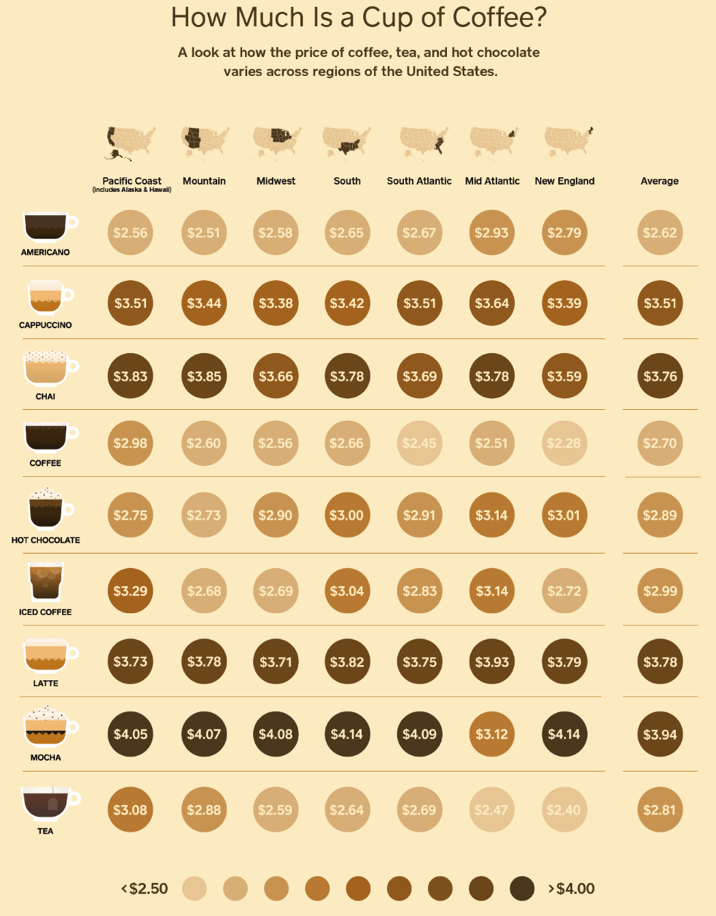NEW YORK – If you’re one of the millions of Americans who gets their daily coffee kick at Starbucks, you may already have felt an extra pinch in your wallet. Starting this week, prices on some drinks are going up by as much as 30 cents. And others will follow suit.
Part of the increase is being driven by rising wages. Starbucks just announced it will be giving employees in U.S. stores raises of 5 percent to 15 percent this fall. Some other retailers have also hiked their wages. And many have been forced to provide raises as cities and states across the country have voted to raise their minimum wages following years of activism from the union-backed Fight for $15 movement.
A report from Credit Suisse in May warned that raising the federal minimum wage to $10.25 per hour by 2020 could cost 20 percent of store-level profits. A national minimum wage of $12 to $15 could be “dramatically worse.” So it’s inevitable some of these costs will be passed on to consumers, business owners say.
Americans on average paid $2.70 for a cup of coffee and $3.78 for a latte last year, according to a study by mobile payment company Square. While customers at higher-end shops may be able to shoulder price increases, analysts say the lower-cost cafes may be squeezed by wage inflation.
“I looked into Dunkin’ Donuts and they operate at about a 5 percent profit nationally; Starbucks has a higher profit margin at 14.4 percent, so Starbucks may be in a better position to raise prices,” says Mark Perry, a professor of economics at the University of Michigan and scholar at the American Enterprise Institute. “But Dunkin’ Donuts is very price-competitive. They could get squeezed from these wage pressures that can’t really be offset by price increases.”
Smaller specialty chains also expect to increase prices.
“We expect to raise our coffee prices when this (minimum wage increase) takes effect,” says Jonathan Rubinstein, owner and founder of Joe Coffee, a specialty chain with a dozen locations in New York City and Philadelphia. “We have run the numbers and if we raised every hourly wage to $15 per hour, we would run this business at a loss.”
Despite the price increase, some coffee customers are likely to understand the need to increase prices if they feel they are getting value for their money, says Liz Dean, director of retail at Irving Farm Roasters, a New York seller of coffee, beans and accessories. Dean stresses that minimum wage increase is a win for both employees and employers.
“Most of our staff members are trained to engage with the customers (on price increases),” says Dean. “When we have had those conversations, people are generally receptive.”
Retailers are also reducing labor costs through technology, including mobile ordering and payment. Credit Suisse estimates that Starbucks processes 20 percent of domestic sales through its mobile app, and consumers are quickly adopting the mobile option to pre-order.
Some analysts argue that the additional disposable income for consumers resulting from a higher minimum wage may actually help businesses. Cowen and Company estimates that the minimum wage increases in California and New York State will eventually add $20 billion to consumer wallets by 2020.
To workers, the wage increase will bring about much-needed stability in a profession that sees many working multiple jobs to support themselves.
“It’s a lot of labor, emotional and physical, training and work for not much return,” says Marilyn Wolmart, a 24-year-old New York City-based barista. “Thankfully, I work at two coffee shops that do pay well above minimum wage, but that is rare and it has taken two years of constantly working to get here.”
Others in the industry are cautiously optimistic about wage increases, but note that it may change working culture, with baristas expected to take on more responsibilities, says Griffin Garnett, a barista at The West coffee shop in New York City.
Understaffing and more consistent scheduling of shifts were the focus of an online petition to Starbucks last month by Jaime Prater, a Starbucks barista based in California. The petition, which urges the company to improve working conditions, has since garnered almost 13,000 signatures.
Starbucks, in a statement to employees yesterday, vowed to increase wages by at least 5 percent starting in October and to improve working conditions for employees, including those worried about working enough hours to qualify for benefits.
“While we have made progress over the years in providing more stability and consistency in scheduling, our field leaders are committed to make every effort to help you meet your specific scheduling needs especially when it comes to ensuring your benefits eligibility going forward,” wrote CEO Howard Schultz.


















